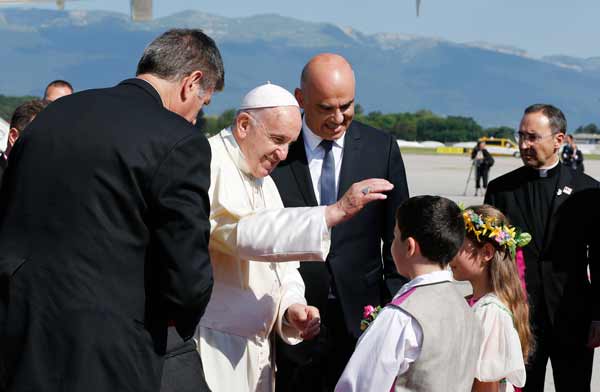
By Christopher White, The Tablet’s National Correspondent
GENEVA – Living the Christian faith requires a surrender of individualism, including one’s particular party preferences, in exchange for a full-throttled commitment to Jesus Christ, Pope Francis said on Thursday.
With that admonition, Pope Francis kicked off a daylong ecumenical pilgrimage to Geneva, Switzerland, to mark the 70th anniversary of the World Council of Churches (WCC). Upon arrival, the pontiff was greeted by uniformed Swiss guards, the only place outside of the Vatican that this occurs.
Since its founding in 1948, the WCC has been at the center of the push for Christian unity – an effort that has been close to Francis not just during the last five years of his papacy, but dating back to his time as a priest and bishop in Argentina where he would preach to thousands of Catholics and Protestants alike in at Buenos Aires’ Luna Park stadium.
Offering a reflection on St. Paul’s letter to the Galatians, Pope Francis said that Christian life requires sacrifice, because it demands that personal interests, such as ethnic ties or party lines no longer become central to one’s identity.
“To choose to belong to Jesus before belonging to Apollos or Cephas, to belong to Christ before being ‘Jew or Greek,’ to belong to the Lord before identifying with right or left, to choose, in the name of the Gospel, our brother or our sister over ourselves…in the eyes of the world, this often means operating at a loss,” he said.
Since first announcing that he would visit the WCC, Pope Francis has insisted that he’s visiting as a pastor rather than as a head of state, in support of the WCC’s goal to “seek visible unity in one faith and one Eucharistic fellowship.”
Today, the WCC represents over 560 million Christians from nearly 350 member churches. The Roman Catholic Church is not a member, but cooperates with the WCC on many fronts.
At an opening prayer service at the WCC’s Ecumenical Center, the Holy Father explored what it means for Christians of different backgrounds and confessions to “walk in the Spirit.”
For Pope Francis, walking is not a solo activity, but requires an awareness and a concern for fellow traveling companions.
“Walking, in a word, demands constant conversion,” he insisted, noting that Jesus Christ provided the ultimate example of this, becoming a “wayfarer and a guest in our midst.”
To walk in the spirit, he continued, requires a rejection of worldliness through a denunciation of materialism.
The pope was speaking following prayers for repentance, reconciliation, and unity. While he did not explicitly reference it, he went on to explore similar themes which, on previous occasions, he has dubbed as the “throwaway culture” – an all-encompassing critique of modern culture defined by waste and greed.
“The thirst for material things blinds us to our companions along the way, and indifference prevails in the streets of today’s world,” said Pope Francis. “Driven by our instincts, we become slaves to unbridled consumerism…other people, especially those who cannot walk on their own, like children and the elderly, then become nuisances to be cast aside. Creation then comes to have no other purpose than to supply our needs.”
By embracing an identity in Christ rather than by things of this world, Francis posited, the project of ecumenism becomes much more conceivable.
“How difficult it is to overcome hard feelings and to foster communion! How hard it is to leave behind centuries-old disagreements and mutual recriminations,” he said – noting that this is the legacy of Judas who betrayed Christ and did not act with the mindset of a true apostle.
“Our differences must not be excuses. Even now we can walk in the Sprit: we can pray, evangelize, and serve together,” he urged.
While the Roman Catholic Church has never had formal membership in the WCC, it has participated in numerous initiatives over the years, including permanent representation on its Faith and Order Commission. Both Pope Paul VI and Pope John Paul II made visits to the WCC during previous papal trips to the country, but none have singled out the WCC in the way that Pope Francis has done.
After landing in Geneva, Pope Francis met with president of the Swiss Confederation, Alain Berset, where he presented him with a print depicting the first commander of the Swiss Guard.
At age 46, he is the youngest president of the country in over 75 years. Given his background in economic development and migration, the two likely discussed issues of key personal significance to both leaders.
Following the ecumenical prayer service, Pope Francis will join ecumenical leaders around the world for lunch before delivering formal remarks later this afternoon in which he is expected to outline vision for Christian unity.
Later today, he will celebrate Mass for what is expected to be a crowd of at least 40,000 individuals.
In closing out his morning remarks, Pope Francis issued an explicit plea for the shared goals of Christianity unity to become a reality:
“Our lack of unity is, in fact, ‘openly contrary to the will of Christ, but it’s also a scandal to the world and harms the most holy of causes: the preaching of the Gospel to every creature,’ he said, citing “Unitatis Redintegratio,” the 1964 document from the Second Vatican Council dedicated to ecumenism.
“The Lord ask us for unity; our world, torn by all too many divisions that affect the most vulnerable, begs for you,” Pope Francis said.
“In him, we will come to see that, for all of our failings, nothing will ever separate us from his love,” he concluded.

Sacrifice creates all round empowerment.